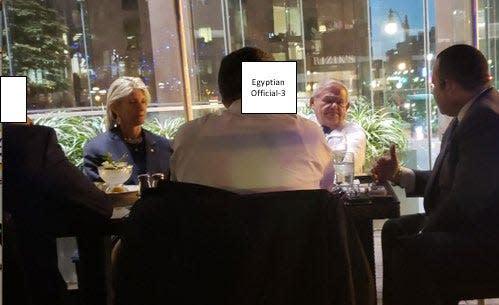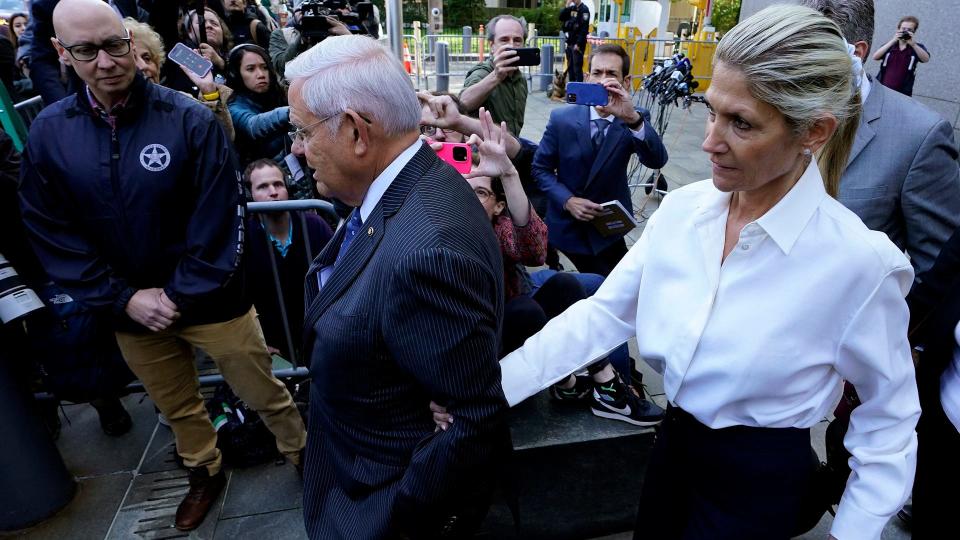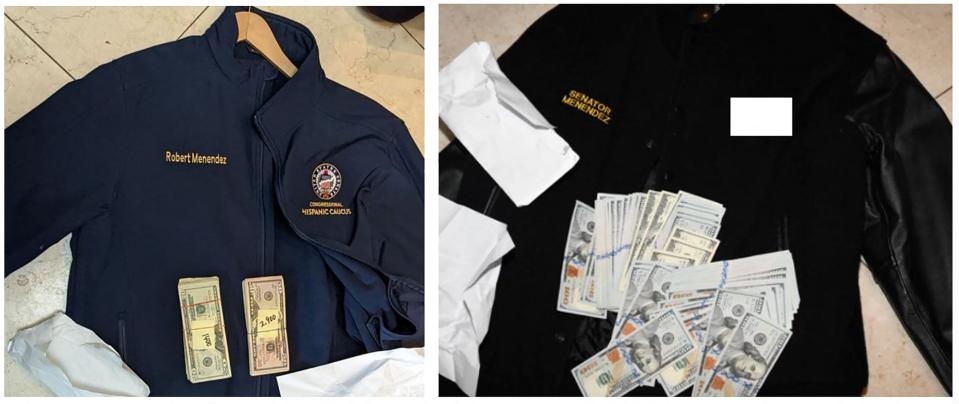Senator or secret agent? How Robert Menendez is alleged to have been Egypt's inside man
WASHINGTON ? The deal was sealed over meetings and dinner, federal prosecutors say. Officials representing Egypt's authoritarian government wanted a powerful American's help with weapons sales and financing. Sen. Robert Menendez and his then-girlfriend Nadine Arslanian said the senator could facilitate both.
In exchange, a New Jersey middleman ? a struggling Egyptian-born entrepreneur named Wael "Will" Hana ? allegedly promised the future Mrs. Menendez a low- or no-show job. He would later sweeten the pot with wads of cash and gold bars.
In the middle of one of many encounters, Menendez ? the influential chairman of the Senate Foreign Relations Committee ? and Arslanian joined an Egyptian intelligence official, Hana, and an associate for dinner at a posh Washington steakhouse.
Arslanian boldly cut to the chase. "What else can the love of my life do for you?" she asked.
The offer is part of the story prosecutors unspooled in a shocking indictment charging the couple and Hana with conspiring to use New Jersey's senior senator as an eager tool of Egypt's government. The defendants pleaded not guilty to the foreign agent charge in a New York federal courthouse in October, and to bribery and extortion charges the previous month.
The indictment represents the most serious criminal charges filed against a sitting U.S. senator in recent memory, alleging that Menendez sold his position and influence to a foreign power for tawdry personal gain.
The indictment offers an intimate look at how a powerful lawmaker allegedly undermined national security for financial gain.
US and Egypt are close but strained allies
For decades, Egypt had been a stalwart U.S. ally ? and a top recipient of American aid in one of the world's most volatile regions. The relationship has deteriorated sharply in recent years over U.S. concerns about Egypt's human rights record; the government of President Abdel Fattah el-Sisi, who took power in a military coup, holds an estimated 60,000 political prisoners.
From his perch as the top Democrat on the Senate Foreign Relations Committee, Menendez had huge sway over decisions to continue ? or sometimes hold back ? hundreds of millions of dollars in aid to Egypt, as well as billions more in weapons sales and financing.
“A member of Congress swears an oath to the United States," said David Laufman, a former federal prosecutor and chief of counter-intelligence for the Justice Department. "Their duty of loyalty, without division or equivocation, is to the United States government, not to serve the interests of foreign military or foreign intelligence services.”
In a statement to USA TODAY, Menendez vehemently rejected the allegations.
“The government’s latest charge is as outrageous as it is absurd,” Menendez said, asserting he has a long record of challenging Egyptian leaders on issues like human rights. “I have been, throughout my life, loyal to only one country ? the United States of America, the land my family chose to live in democracy and freedom.”
A lawyer for Hana told USA TODAY his client "is innocent and has nothing to hide."
"Moreover, the recent allegation that Mr. Hana was part of a plot concocted over dinner to enlist Sen. Menendez as an agent of the Egyptian Government is, as the evidence will show, completely false," said attorney Lawrence Lustberg.
The senator recently boasted that he’s been able to maintain his top-secret security clearance despite the federal charges. Requests for comment from lawyers for Menendez were not answered. An attorney for his wife declined to comment.

Gold bars, fingerprints, and famous company
Menendez and Arslanian were married in October 2020.
Prosecutors say they found hundreds of thousands of dollars in cash and gold bars during a raid on the couple's home, with DNA, fingerprints, and serial numbers linking the haul to other alleged participants named in the bribery and foreign influence indictments.
The Menendez charges come as the Justice Department probes whether President Joe Biden's son Hunter Biden violated the Foreign Agents Registration Act, known as FARA, by failing to register while working in the U.S. on behalf of companies based in China and Ukraine.
The department has also pursued FARA prosecutions against Paul Manafort, former President Donald Trump's one-time campaign manager, and Michael Flynn, a top national security adviser to the campaign. The prosecutions were part of a growing effort to use the once-staid foreign agent law against big-league targets.
In Manhattan, prosecutors are using a similar approach against Menendez ? but with a legal twist.
Position of influence
Bob Menendez wasn't just any senator. The veteran New Jersey Democrat was the ranking member and then chairman of the Senate Foreign Relations Committee, with the power to stop U.S. funding to allies around the globe. In 2017, the committee canceled $65.6 million in military financing, and in 2022 the State Department withheld $130 million in assistance.

The senator, according to prosecutors, wielded that influence to benefit the Egyptian government and himself. They accuse him of sharing nonpublic information on personnel at the U.S. Embassy in Cairo with his then-girlfriend, who allegedly got the information to an Egyptian official through Hana. They say he secretly helped draft a letter for the Egyptian government aimed at convincing his fellow senators to release $300 million in aid. Menendez allegedly instructed his wife to tell Hana he was going to sign off on a $99 million arms deal.
Further immersing himself in Egyptian affairs, prosecutors say the senator pushed U.S. diplomats to engage in negotiations that had stalled between Egypt, Ethiopia, and Sudan over an Ethiopian mega-dam on the Nile River. Around 2022, Menendez sent his wife a news article on pending military sales to Egypt worth about $2.5 billion. She forwarded it to Hana with a message: "Bob had to sign off on this."
Nadine Menendez was the apparent go-between in the alleged conspiracy. Around March of 2020, prosecutors say, she texted an Egyptian official with a bold reassurance: "Anytime you need anything you have my number and we will make everything happen."
'Never been utilized before'
These details form the basis of the foreign agent charge against Menendez, his wife and Hana, which may be the first prosecution of its kind. The charge is tied to a law that federal prosecutors began enforcing more aggressively following concerns about foreign interference in the 2016 presidential election: the Foreign Agents Registration Act, which requires anyone lobbying in the U.S. on behalf of a foreign government or entity to register with the Justice Department. Failure to register is a felony crime.
But FARA exempts sitting U.S. senators ? and some other senior U.S. government officials ? from having to register because of the nature of their jobs. So in Menendez's case, prosecutors dredged up a related statute that makes it a criminal offense for a "public official" of the United States "to be or to act as an agent of a foreign principal required to register under FARA."
Specifically, the indictment alleges that from at least January 2018 through at least June 2022, when the FBI conducted search warrants, Menendez, Arslanian and Hana "willfully and knowingly combined, conspired, confederated, and agreed together and with each other" to have Menendez act as an agent of the government of Egypt and Egyptian officials.
Brandon Van Grack, a national security lawyer who oversaw foreign influence investigations and prosecutions for the Justice Department, told USA TODAY that to his knowledge, the statute has never been used before the Menendez case.
"Utilizing this law," he says, "signals that the Department of Justice continues to aggressively enforce both FARA but also all laws that are connected to the issue of foreign influence."

Federal authorities took a fresh look at FARA statutes in 2015, when they became alarmed that Russia was using operatives inside the U.S. to mount an unprecedented clandestine effort to influence the outcome of the 2016 presidential election, said Van Grack, who was a senior prosecutor on special counsel Robert Mueller's investigation of Russian interference.

Justice Department officials, looking for existing legal tools to crack down on the electoral sabotage, homed in on FARA as one way to go after the suspected agents of influence. In turning to the foreign agents law, they ensnared two key players in Trump’s 2016 campaign: Paul Manafort, Trump’s former campaign chairman, and Michael Flynn, a top national security adviser to Trump.
Suddenly, the Justice Department’s FARA unit was no longer viewed as a sleepy enforcement office chasing lobbyists who forgot to register as foreign agents. The unit became a critical weapon in upholding American democracy and national security, Van Grack said.
Paul Manafort and Michael Flynn cases
One of the most high-profile cases involved Manafort, a longtime lobbyist for a pro-Russian political party in Ukraine before he became Trump’s campaign chairman in the summer of 2016.
In 2018, after being convicted in his criminal trial on bank fraud and tax charges, Manafort pleaded guilty in federal court in Washington to conspiracy to commit multiple offenses, including failing to register under FARA as a longtime agent of the Ukraine government, the pro-Russia Ukrainian Party of Regions and former Ukrainian President Viktor Yanukovych, the Justice Department said.

Another prominent FARA case under Trump, stemming from the Justice Department's Russia election interference investigation, was the case of Flynn, the former Trump national security adviser and retired Army lieutenant general. In 2017, Flynn pleaded guilty to making “materially false statements in multiple documents” filed pursuant to FARA requirements in connection with work he had done for the government of Turkey.
What makes the Menendez case different is that the Justice Department is using the "foreign agent" statutes to charge a sitting senator with acting as an agent of a foreign government, said Ryan Fayhee, a former prosecutor in the Justice Department's Counterespionage Section.
"Obviously this use of it in the Menendez case is totally unprecedented," Fayhee told USA TODAY, "even if, as we've seen over the years, the use of the FARA statutes is really evolving and becoming part of the toolkit that prosecutors use."
Menendez and his co-defendants have denied wrongdoing, and the senator has suggested that it's still business as usual for him on the Senate Foreign Relations Committee even though he was forced to step down from the chairmanship after the charges were filed.
“I still have all my intelligence credentials,” Menendez said on New Jersey PBS’s Chatbox with David Cruz show, adding that he still attends regular committee briefings, including on the Israel-Hamas war.
Five days after that interview, one of Menendez's fellow Democrats, Sen. John Fetterman of Pennsylvania, introduced a resolution that would strip any senator facing such charges of their committee assignments, prohibit them from accessing classified information or classified briefings, and bar them from requesting earmarks or using official funds for international travel.
“When you find gold bars stuffed in a mattress, the jokes write themselves. But our national security isn’t funny, it’s often life or death,” Fetterman said. “The Senate has an obligation to its constituents and this country to do everything it can to protect national security, and that means making sure that senators who are currently indicted for acting as agents of foreign powers don’t have access to our most sensitive national secrets."
Laufman, who served as DOJ's counterintelligence chief from 2014 to 2018, agreed that the allegations against Menendez are "exceedingly concerning," especially given his position.
Laufman, now at the Washington law firm of Wiggin and Dana, said he was skeptical of Menendez’s claim that he was acting in his official capacity in his dealings with Egyptian officials.
It’s common and accepted practice, especially for someone on the Senate Foreign Relations Committee, to interact with foreign government officials and to take good faith positions that they believe are in U.S. interests, Laufman told USA TODAY.
“Those debates happen all the time. Those are all valid expressions of disagreement and of a healthy democracy,” Laufman said. “But he's alleged to have done something more than that by acting, as alleged, in the interest of Egyptian military and intelligence officials to influence U.S. government action on behalf of Egypt in ways that he concealed and for remuneration. And that's a gigantic horse of a different color.”
Former Rep. Tom Malinowski, D-N.J., told USA TODAY that the charges against Menendez should raise alarms about whether he was secretly helping Egypt secure U.S. military aid even as he was allegedly getting paid under the table to help the Sisi government.
"I'm sure that Bob Menendez did not single-handedly stand in the way of more restrictions on Egypt. But he was a key person in the room when these things were being negotiated” in Congress, said Malinowski, a former assistant secretary of state for democracy, human rights and labor. "Knowing now that there's evidence he was involved in a corrupt relationship with the government we were trying to hold accountable is very troubling.”
A bill shot down, looking forward to trial
In the Menendez indictment, prosecutors say the senator made multiple requests between 2020 and 2022 for the Justice Department to investigate an alleged FARA violation by a group including a former member of Congress ? an apparent reference to David Rivera, a one-term Florida Republican arrested last year on money laundering and foreign agent charges related to his consulting work for the Venezuelan government and its state oil company.
While Menendez, a longtime opponent of Venezuela’s socialist government, favored using FARA against Rivera, he also single-handedly shot down a 2020 attempt by Iowa Republican Sen. Chuck Grassley to strengthen the foreign agent law. Grassley's bill would have increased penalties for violations and required reviews of exemptions to the registration requirement.

At a September news conference after the initial bribery and extortion charges, Menendez said he had a long record of challenging Egypt’s government on human rights abuses and other issues. He also said he has withdrawn thousands of dollars in cash from his personal savings account for 30 years because he wanted to be ready for emergencies and based on his family's experiences with confiscation in Cuba.
"I look forward to addressing other issues at trial," he said.
This article originally appeared on USA TODAY: Senator or secret agent: Was Bob Menendez Egypt's inside man?
